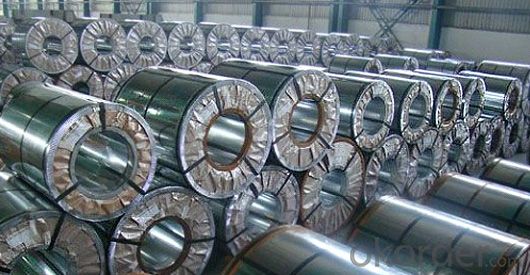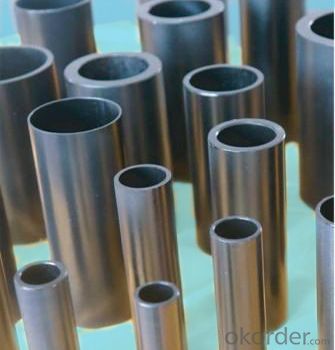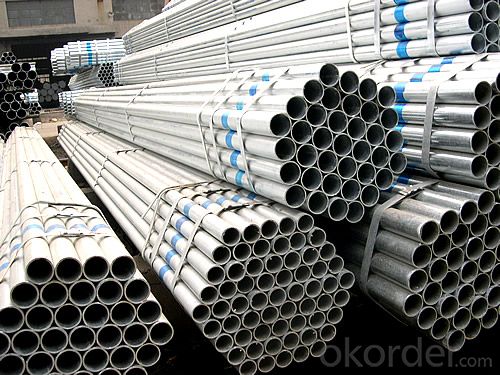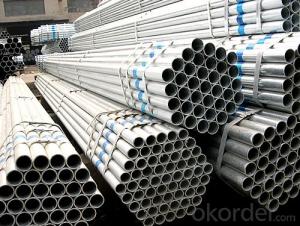Regular Spangle Galvanized Steel for Garage Doors
- Loading Port:
- Tianjin
- Payment Terms:
- TT OR LC
- Min Order Qty:
- 25 m.t.
- Supply Capability:
- 1000 m.t./month
OKorder Service Pledge
OKorder Financial Service
You Might Also Like
Regular Spangle Galvanized Steel for Garage Doors
Quick Details
| Standard: | ASTM, DIN, JIS | Grade: | A591, ST1203, G3313 | Thickness: | 0.25 ~ 2.40 |
| Type: | Steel Coil | Technique: | Cold Rolled | Surface Treatment: | Galvanized |
| Application: | Container Plate | Special Use: | High-strength Steel Plate | Width: | 20mm ~ 1524mm |
| Length: | As your requirement (Sheet & Coil) | Electro Galvanized Steel Sheet: | egi | Electro Galvanized Steel Sheet & Coil: | egi |
PRODUCT FEATURES
Formability - Unlike Hot-Dipped Galvanized Steel, the base metal of the Electro-Galvanized Steel
is less affected by the heat and therefore, it is able to retain its formability.
Paintability - Free from any spangles and pin-holes, the Electro-Galvanized Steel has a flawless
surface that is most ideal for any type of painting.
Corrosion Resistance - The EGI's evenly coated zinc enhances its resistance to any type of corrosion.
(Additional surface treatments are available for further enhancement of corrosion resistance.)
Weldability - Among all coated steel, the EGI has the highest weldability due to minimum
amount of zinc being coated.
.Application of hexavalent chromium alternative material
- Develop trivalent chromium, a stable material, as the main component
(Add etching agent, reducing agent, level agent, etc.) : Cr-free, non-toxic chromate
- Superior corrosion resistance: secure same corrosion resistance level of existing products
.Environment-friendly products
- Environment-friendly products harmless to humans and environmental pollution preventive
- Actively corresponds to environmental regulations of Europe and other leading countries
Specification & Available size range
| Item | Figure | Coating | Quality | Surface |
| Thickness | 0.25 ~ 2.4mm | 05/05 G/SQ MTR | SECC | PHOSPHATED |
| Width | 600~ 1,524mm | 10/10 G/SQ MTR | SECD | CHROMATED / CHROME FREE |
| Sheet Length | 600 ~ 5,000mm | 20/20 G/SQ MTR | SPEC | OILED |
| Coil Inner Diameter | 508 / 610 mm | 30/30 G/SQ MTR | SECEN | ANTI FINGER |
An order of inquiry should be accompanied by the following information.
1. Size : Thickness / Width / Length ( in case of Cut Lengths).
2. Specification requirement : Coating designation or Wt / Type of coating & surface treatment
Coil I.D / Packing Weight.
3. Quantity.
4. Intended use
5. Packing and marking requirement.
6. Delivery Requirement.
7. Required inspection, if other than mill inspection.
8. Other pertinent information.
Picture:



- Q:I have a knife with 154cm steel on it and I always here that you should put oil on it to keep it from rusting but I am just wondering what kind of oil? And how do I apply it and do I just leave it on there?
- It's stainless steel so it doesn't really need to be oiled. Anything will do for oil if you want to wipe it down. Just put a little on a paper towel and give it a once-over.
- Q:I have heard that heating the steel and applying oil will help with corrosion, and will give that aged look. I would like to know finishes available without painting. thanks
- No, I don't think the oil will do what you want. I have heated and quenched metal in oil several times (to harden it) and it did not give a finish to steel. I have heard of heating steel to a high temperature (red) and putting powdered sulfur on it, it will make a black finish. BUT, sulfur stinks and you would not do this indoors. And I don't know what the results would be like for indoor use. At the hardware store, you can find something like POR (paint on rust), a brand name of rust neutralizer. There are others. You spray it on (or paint) and it will turn rust into a glossy black material. Other than that, I think paint is your best option. Check out the new finishes they have now, if you haven't checked, they have come a long way. If you let them dry completely (in the sun) the spray can finishes are very durable. Good luck! Ooops, I forgot about gun finishes. Yes, some are blue, you might be thinking of that, but that is only if you put several coats on. One coat might do it. Plus, there are other colors, such as black (see the parkerizing link on the list). Here is a good company, they can be lots of help, too.
- Q:How are steel coils inspected for dimensional accuracy during processing?
- Steel coils are inspected for dimensional accuracy during processing through various methods such as measuring tape, calipers, laser scanners, or automated vision systems. These tools are used to measure the length, width, and thickness of the coils to ensure they meet the required specifications and tolerances.
- Q:How are steel coils used in the manufacturing of agricultural machinery?
- Steel coils are used in the manufacturing of agricultural machinery primarily for the fabrication of structural components and parts such as frames, chassis, axles, and brackets. The high strength and durability of steel make it an ideal material for these applications, ensuring the machinery can withstand the harsh conditions and heavy loads typically encountered in agricultural operations. Steel coils are processed and formed into the required shapes and sizes to create sturdy and reliable components that contribute to the overall performance and longevity of agricultural machinery.
- Q:What is the cost of steel coils?
- The cost of steel coils can vary depending on factors such as the type of steel, quality, quantity, and market conditions. It is best to contact suppliers or check market prices for the most accurate and up-to-date cost information.
- Q:I wasn't expecting much because i knew it was cheap (Trying to avoid high prices) But anyway i cut a few bottles and cans and i noticed the very edge of the blade was starting to bend. I ignored it and tried it on a 3 inch limb, and the whole blade bent sideways where the limb hit it.I heard cold steel was supposed to be top quality and I wanted to know how durable their swords are and if they're worth it. Thanks!
- Yes. Cold Steel is a great company with a quality product, and I've always been happy with their work. Their katanas, while not made in the traditional method, are heavy duty carbon steel and should handle abuse well. I'd recommend them based on my experience with other Cold Steel products.
- Q:I am doing a project on how revolvers work and what materials they use and would like to know what specific grade of stainless steel they use for the manufacturing of the frame and cylinder?
- *Rifle barrels are usually made from steel alloys called ordinance steel, nickel steel, chrome-molybdenum steel, or stainless steel, depending upon the requirements of the cartridge for which they are chambered. The higher the pressure and velocity of a cartridge (pressure and velocity usually go up together), the faster it will wear out a barrel. To give a satisfactory service life, barrels for high velocity cartridges must me made from tougher and harder steel than barrels for lower pressure cartridges. *The 400 (416) series SS commonly known as ordnance grade , is what barrels are made from . *If you want your barrel to be made from super alloy then it is 718 Inconel ,but a costly affair.
- Q:What are the different methods of pickling steel coils?
- There are several methods of pickling steel coils, including acid pickling, electrolytic pickling, and mechanical pickling. Acid pickling involves immersing the coils in a bath of diluted acid, such as sulfuric acid or hydrochloric acid, to remove surface oxides and impurities. Electrolytic pickling uses an electric current to remove the oxide layer from the steel coils, usually in a solution of sulfuric acid. Mechanical pickling involves scrubbing the coils with abrasive materials or using mechanical rollers to remove the scale and impurities. Each method has its own advantages and is chosen based on the specific requirements and conditions of the steel coils.
- Q:How are steel coils used in the production of structural components?
- Steel coils are an integral part of the production process for structural components. These coils, which are made of steel that has been rolled into a continuous strip, provide the raw material necessary for manufacturing a variety of structural components, such as beams, columns, and trusses. The first step in using steel coils for structural components involves uncoiling the strip and cutting it into the desired lengths. This can be done using a variety of cutting methods, such as shearing or sawing. Once the coils are cut into lengths, they are then processed further to shape them into the specific structural components needed for a particular project. One common method used to shape steel coils into structural components is through the process of bending or forming. This involves using specialized machinery to bend or shape the steel into the desired configuration. For example, a steel coil can be bent into an I-beam shape, which is commonly used as a load-bearing structural component in buildings and bridges. Another method used to shape steel coils into structural components is through the process of welding. This involves joining multiple steel coils together to create a larger component. Welding is often used to fabricate components such as columns or trusses, which require the combination of multiple steel coils to achieve the necessary strength and structural integrity. Once the steel coils have been shaped and formed into the desired structural components, they may undergo additional processes, such as surface treatment or coating, to enhance their durability and resistance to corrosion. This ensures that the components will have a long lifespan and can withstand the demands of their intended applications. In summary, steel coils are essential in the production of structural components as they provide the raw material necessary for manufacturing. Through processes such as cutting, bending, and welding, steel coils are shaped into the specific components needed for various construction projects. These components play a crucial role in supporting the structural integrity of buildings, bridges, and other structures.
- Q:How are steel coils used in the manufacturing industry?
- Steel coils are widely used in the manufacturing industry as they are essential for various applications such as automotive, construction, appliances, and machinery. These coils are commonly used to produce various metal components and parts, including sheet metal, pipes, tubes, and wire. The coils are unwound and fed into different machines and processes, where they are shaped, cut, stamped, or welded to create the desired products. Due to their durability, strength, and malleability, steel coils are highly valued for their versatility and play a crucial role in the manufacturing industry.
1. Manufacturer Overview |
|
|---|---|
| Location | |
| Year Established | |
| Annual Output Value | |
| Main Markets | |
| Company Certifications | |
2. Manufacturer Certificates |
|
|---|---|
| a) Certification Name | |
| Range | |
| Reference | |
| Validity Period | |
3. Manufacturer Capability |
|
|---|---|
| a)Trade Capacity | |
| Nearest Port | |
| Export Percentage | |
| No.of Employees in Trade Department | |
| Language Spoken: | |
| b)Factory Information | |
| Factory Size: | |
| No. of Production Lines | |
| Contract Manufacturing | |
| Product Price Range | |
Send your message to us
Regular Spangle Galvanized Steel for Garage Doors
- Loading Port:
- Tianjin
- Payment Terms:
- TT OR LC
- Min Order Qty:
- 25 m.t.
- Supply Capability:
- 1000 m.t./month
OKorder Service Pledge
OKorder Financial Service
Similar products
New products
Hot products
Related keywords





























